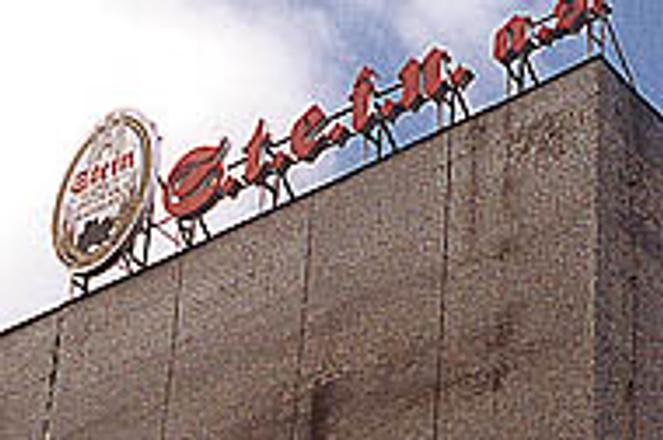Bratislava's Stein brewery must get an investor by September 11 or face extinction.photo: Ján Svrček
On Bratislava's Blumentálska Street, the aroma of fermenting hops and barley wafts out from what appears an ordinary, grey office block. The heady fumes sometimes stop pedestrians in their tracks.
A quick turn of the head to discover the source of the arresting smell reveals the Stein brewery. Brewing beer since 1873, Stein has built up a proud tradition, but has seen its domestic beer market share slump to 4.3% at the end of 2000. Unless a third tender for an investor into the brewery, which was declared bankrupt in 1999, is a success, Blumentálska's hops odour will soon become a distant memory.
By the end of the tender on September 11, those close to the bankruptcy process privately admit, the brewery's fate will be sealed - for better or worse.
"We want to sell the whole brewery to keep the name going. But if we don't, Bratislava will lose its own regional brewery," a member of the bankruptcy commission, who asked not to be named, told The Slovak Spectator.
Stein's managers refused to discuss the brewery's past or present problems. However, suspicions were raised that the company was in trouble when its production, which once stood at 700,000 hectolitres a year, started to tail off in the 1990s, falling to 250,000 hectolitres annually at the end of 1999 and dropping a further 47,000 over the first 10 months of last year.
In 1999 the German firm Joh Barth und Sohn, one of Stein's creditors, filed a motion for bankruptcy against the Bratislava brewery. Since then, two tenders to find an investor to save the company have failed. It is unclear if the third will be any more successful.
Similar fates
The brewery's story is one that mirrors that of many other regional breweries since the fall of communism in 1989. The move to a market economy forced some smaller, inefficient breweries to close. Others were swallowed up by larger domestic breweries and international giants.
Some breweries still in domestic hands have blamed the fall of regional brewers, such as the eastern Slovak Michalovský and Košický breweries and the western Slovak Ilavský beer maker, on aggressive marketing techniques applied by western firms such as Heineken. With the funds to back up huge marketing campaigns which smaller firms could not compete with, foreign brewers have swallowed up market share and forced others out of business, they argue.
But while Heineken and South African Breweries now dominate the Slovak beer market - they have 42% and 20% market shares respectively - the names of many Slovak breweries have been kept alive by their entries. Without foreign capital, argues the Slovak Union of Beer and Malt Producers, Slovak brewers would not survive.
"The development of the modern Slovak brewing industry without finances is impossible," said Roman Šusták, the union's executive director. "Survival on the market is a question of the marketing strategies of individual breweries".
But others disagree. "In 1989 we knew that a battle for the market would break out. Those who tried and worked hard survived," said Jozef Nemec, the marketing director at Topvar, the biggest Slovak brewery still without foreign capital. "Foreign investments into Slovak breweries aren't necessary. The beer industry here would be able to survive without them. Investments should go somewhere else. We shouldn't sell our golden apples - companies that are prosperous.
"It's a pity that some regional breweries have disappeared. It would be very sad if Slovakia didn't have any of its [own] breweries, because we have a long tradition of producing good beer."
A consolidated market
Slovakia at present has 12 breweries. Heineken Slovensko - part of the largest beer exporting group in the world, Heineken NV - is the largest brewery in Slovakia. It entered the Slovak market in 1995 with its acquisition of the Zlatý Bažant brewery, later expanding its portfolio to include Corgoň, Martiner and Gemer. In total, Heineken's Slovak acquisitions turn out more than 2 million hectolitres of beer a year.
South African Breweries control Slovakia's second largest brewery, Šariš, which produces its own eponymous brand as well as the Czech beers Gambrinus and Radegast, under licence. Topvar is Slovakia's third largest brewery, producing 600,000 hectolitres a year, followed by Steiger with 300,000. The production of each of the other five breweries - Stein, Tatran, Urpín, Popper and Horden - stands at around 200,000 hectolitres per year.
When Heineken acquired the Martiner and Gemer breweries, which at the time were daughter companies of the domestic KK Company, KK's representatives said that the breweries were on their last legs, living hand to mouth, threatened with closure unless foreign capital was found. Today, Heineken says the companies are thriving.
For Stein, a similar foreign capital entry scenario seems the only way to keep its malt vats full. The Beer Union's Šusták hopes an investor can be found.
"Stein beer is popular in the region and I personally like it," he said. "It used to produce the largest volume of beer in Slovakia and it's a pity that it's production has fallen away. Bratislava should have had its own functioning brewery as other cities do."


